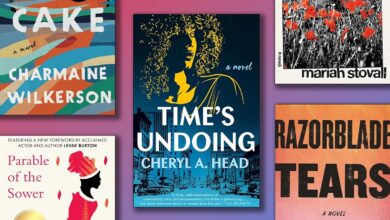Israeli-Canadian author reflects on writing after October 7, and her own Yemeni heritage

Israeli-Canadian author Ayelet Tsabari struggles to express, in brief, what’s transformed in her life since the Oct. 7, 2023 Hamas attacks on Israel and the resulting war in Gaza, and since the publication of her award-winning novel, Songs for the Brokenhearted, in fall 2024.
Tsabari, who moved back to Israel from Canada in 2018, calls it a big question — maybe too big to answer fully right now, she told The CJN in an interview.
Her solution: keep going, despite any doubts.
“I can admit that I’ve had moments of wanting to quit writing, because I felt like everything changed so much to the point that I was not sure that my voice really interested people anymore,” she said.
“But honestly, I don’t know what else I could do.”
Tsabari is at work on a book of collected essays — some new and some which have been published — about Jewish Yemeni-Israeli identity and writing after October 7.
“October 7 changed everything,” she said. “It feels like I can’t answer it in a few words. It’s an essay. Maybe a whole book.”
A former Toronto Public Library writer-in-residence, Tsabari’s first book, The Best Place on Earth, is a series of short stories. It was published in 2013, and she won the Sami Rohr Prize for Jewish Literature, while her 2019 memoir, The Art of Leaving, won a Canadian Jewish Literary Award.
Earlier this year, Tsabari visited New York to accept top fiction prizes for Songs for the Brokenhearted from the National Jewish Book Awards and the Association of Jewish Libraries. She returns to North America for a book tour in the fall, with Toronto the only Canadian stop among the U.S. dates.
The University of Toronto hosts one of her events, while an event by Koffler Centre for the Arts is focused on Yemeni Jewish women’s artistic expressions as a kickoff for the month of Mizrahi heritage remembrance. Slated for November 1, the event will feature Tsabari, Toronto-based Yemeni Jewish musician Erez Zobary, and visual artist Karen Pe’er.
Writing after Oct. 7 has been difficult in a number of ways, according to Tsabari.
Several editors’ requests for her to write essays after the Hamas attacks, and Israel’s military response, resulted in pieces like “When Words Fail Us,” published in The New Quarterly, and another, in the New York Times, about cleaning up the kibbutzim in southern Israel’s Gaza envelope area following the Hamas-led massacre.
(In Israel, a cliched stereotype about Yemeni Jewish women is that many work as cleaners, as represented in Songs for the Brokenhearted by one character’s determination to find other jobs, like working in a cafe. Tsabari’s Times essay references her own days working as a cleaner, as her grandmother did for many years, and later her mother, for a shorter period.)
In The New Quarterly essay, Tsabari reflected on editors asking her to write those post-Oct. 7 pieces.
“Everything is so surreal fiction can’t compare. A graduate student I supervise tells me he’s having doubts about his project. What’s the point, he says? I want to encourage him, but I have nothing,” she wrote.
“War dehumanizes. Literature humanizes,” the essay went on in part. “The writer illuminates one home, one voice, and in doing so, makes readers view others as less other.”
Love and critique
Speaking to The CJN, Tsabari reflected that she may perceive some changed relationships within the literary community — aside from those closer to her — but that these remain in the minority.
There are those who would dismiss her perspective because she’s Israeli, she says.
She regularly protests the actions of the Israeli military and government, and is outspoken about being left-wing politically, even though she acknowledges how the timing of the book’s publication, in fall 2024, impacted its reception.
“Someone said to me: ‘You don’t seem to be whining about the way that it [Oct. 7 and the Gaza war] obviously affected your book.’ And I know, it’s disappointing,” she acknowledged. Yet, as she frequently points out, perspective is also important. (Lately, she’s stepped up her activism, becoming involved with a new Israeli grassroots initiative to support Gazan families.)
Readers of the book, she says, will find a story told with nuance, humanity, and courage.
“One of my students said to me, ‘there’s love, and there’s critique, and that’s why I trust it, because it’s true. It’s real.’ And I love that. I thought that meant a lot.”
That honesty comes across to a reader, though not to someone who refuses to pick up the book.
“And a lot of people just won’t, because it’s set there [Israel], and I live here.”
Return to sender: Montreal to Ashdod via Cyprus
In June, Tsabari was visiting Canada during the nearly two weeks of Iran-Israel missile volleys, when returning to her family in Israel became Tsabari’s top priority.
She’d been in Halifax in June to teach a University of King’s College creative nonfiction summer residency, while appearing at book events in that city, and at the Jewish Museum in Saint John, N.B.
Tsabari was visiting her brother in Montreal when she became stranded and learned a boat from Cyprus to the Israeli port of Ashdod had 1,500 available spots. (Online demand for the fares rivalled that of Taylor Swift tickets, she joked.)
She managed to obtain two tickets — one for her and one for a friend — and while sailing from Cyprus, the ship dropped anchor, coming to an unannounced halt.
“We felt that suddenly we were not in movement. We went to the bow, and everyone was there… you could see Ashdod from the distance, which meant that we could get some patchy signal,” for a limited internet connection.
“We managed to talk to people [in Israel] and [we] realized it was missiles happening at that moment from Iran,” and that a ceasefire was to commence “in a couple of hours.”
Four hours later, the skies clear, they reached Ashdod.
“It was a very surreal feeling… on one hand, it felt to us like everything was normal, and nothing happened. But every now and then you’d see people’s faces, and you saw like the post-trauma on their faces, especially those who did not have a shelter or safe room in their home, and spent [those] 12 days either being in a public shelter, or seeking a place to be, and feeling like they’re in a Russian Roulette,” she said.
“It [felt] like I missed something very significant that people here experienced.”
Multiple identities
When in Canada, she says Vancouver, where she met her husband, feels most like home. (His family lives in the area.)
“I feel like that’s another sense of a home,” she said, although Tsabari keeps a special place for Montreal as the first Canadian entry point, before her move to the country.
“I came of age in Israel. I moved away from it at 25,” in 1998, when she arrived to live in Vancouver.
“It’s the first identity that came to mind growing up. Today, I’m also Canadian, and I am also Yemeni and Jewish and Mizrahi and all of those multiplicities of identities.”
The couple moved from Vancouver to Toronto in 2009 for Tsabari’s master’s degree in creative writing through the University of Guelph program, which later took her on as a teacher. They lived in the city until their move to Israel in 2018.
Living near Tel Aviv, Tsabari maintains a closer proximity, now, to the neighbourhood where her family members live, including her mother, siblings, nieces and nephews.
It’s a place she brings alive for readers as the main setting for the novel, and somewhere she’d returned to be with family.
The proximity to her mother and relatives has anchored her to Israel, even with the challenges, including the current far-right Israeli government, which she opposes.
Her doubts about the country’s direction complicates her vision of retiring “by the sea,” amid family and familiarity.
Coming home in 2018, she says, “I was engaging with questions at home and belonging. I find myself still with the same question. Can I live here?”
Yemeni Israeli experience on the page
Through its characters and situations, the novel poses similar questions: Songs, Tsabari’s first long-form fiction, explores the Yemeni experience through the story of a young woman who uncovers a family mystery while reconnecting to her home, community, and heritage.
The narrative, a vivid, evocative tale of family intrigue and love stories, allows the personal to unfold against a historical backdrop of key points in the State of Israel’s history.
The story turns on discoveries of both family secrets, and the deep, haunting connection through Yemeni Jewish women’s songs that connect the young woman’s return to her community with events 45 years earlier, in the ma’abarot or tent-city camps in the State of Israel’s first few years.
The book takes place across two timelines, in 1995 and the 1950s where Tsabari unfurls a forbidden romance against the backdrop of the Yemeni Children’s Affair, when between 1,000 to 5,000 very young children, were believed to have been taken from their biological parents for adoption by, typically, wealthier Ashkenazi families.
The historical scandal, which Tsabari says is “not talked about enough,” resonates with Canadian readers, who have been surprised to hear about the missing children.
When presenting the book here, audiences connect the Children’s Affair to Canada’s residential schools for Indigenous children and the Sixties Scoop, which saw large numbers of children taken from their families by social welfare agencies.
“It comes up,” she says, in Canada, “in a way that [it] clearly does not in the U.S. It strikes [people].”
In recent years in Israel, following several commissions of inquiry beginning in 1960, and a reopened examination of evidence into the affair in 2016, the government officially recognized the situation and enacted laws to permit families to request graves be opened to exhume bodies in cases where children had gone missing.
In 2021, Israeli officials announced an intended compensation plan for families impacted by the affair, nearly all of whom were Yemenite and Mizrahi Jews.
Tsabari has shared a family story involving an aunt by marriage who was taken, albeit, only briefly:
“She was taken to the hospital as a toddler for a common cold, and when her parents came the next day, they were told she had died. Her father would not hear of it. He basically ripped the hospital to pieces and found her. And she was dressed in other clothes,” she told Moment magazine. (A child who was taken to hospital with a cold during the period, investigations have since revealed, would often result in cases of abduction.)
Songs behind the stories of the brokenhearted
Underlying historical events like The Children’s Affair and the political violence in 1990s Israel, the enchanting women’s songs from the Yemeni Jewish tradition create a poetic throughline within Songs for the Brokenhearted.
As the book details, these songs were a subversive yet non-confrontational way for women to express their voices, particularly in a Jewish, Ashkenazi-centred society during modern Israel’s early years.
While researching songs and interviewing singers for the book, Tsabari became increasingly drawn to singing herself. Her family is musical, and she says she always sang, in choirs, and ceremonies, except she hadn’t previously explored Yemeni Jewish women’s songs.
“Just like in the book, singing is a major part of the Yemeni Jewish life.”
Tsabari says she began developing the book’s mother and daughter characters when she still lived in Canada, but only later did the characters and the plot come together, when a Chalmers Foundation grant, run by the Ontario Arts Council, funded her research, allowing her to interview and learn from Yemeni women in Israel.
Through researching the Yemeni women’s songs, in 2014 and 2015, Tsabari met singer Gila Beshari, who became her teacher, and began a deep dive into the songs’ compositions and history, and the act of singing them became a driving force for the book’s direction.
It became important to Tsabari for the singing to become an element of the book launch, last fall in Vancouver, she says.
‘“The whole idea of this tradition is that it is done by a real group, and by women… a sisterhood idea.”
Tsabari posted on a Facebook group for Israelis in the city, looking for Yemeni women who wanted to sing with her.
“And I found a couple of them, two young women that I’d never met before.” They learned and rehearsed three songs together and performed them at the launch, accompanied by Tsabari’s friend, drummer Sasha Levine.
At home, in the Tel Aviv area, she continues to sing, and occasionally drops by the women’s songs group she’d first joined, years ago, when immersing in and developing her singing practice.
Language, place, and belonging
Living in Israel again after 20 years living in Canada, she’s used to a kind of switching between languages.
“I still function a lot in English and work a lot in English while I’m living here. Sometimes it can make you feel a little bit, not entirely belonging, a little bit outside of the place.”
While she struggles with living in a country where she is both at home, and deeply opposed to the current administration, Tsabari appears to be staying put.
Home, she says, is more than a geographical place, and while she’s left questioning what her “political home” looks like, she sees the value of living closer to her family.
Still, Tsabari directs great energy and determination to making where she lives a safe and peaceful place, she hopes, for both Israelis and Palestinians.
“I want to be here and for it to be good.”
Source link





